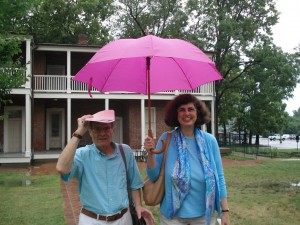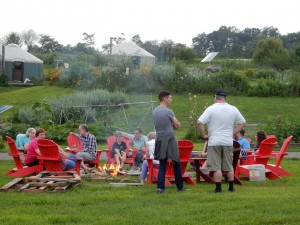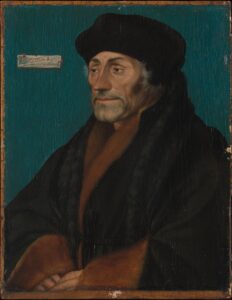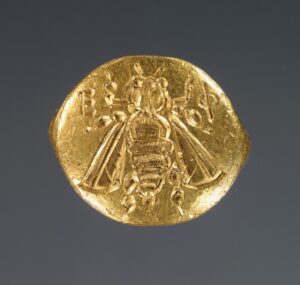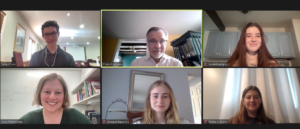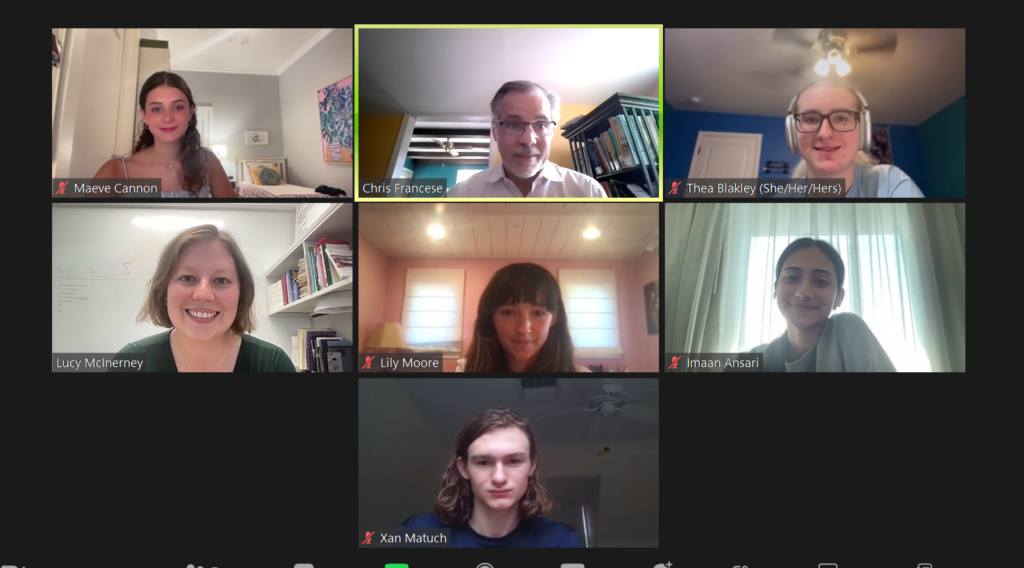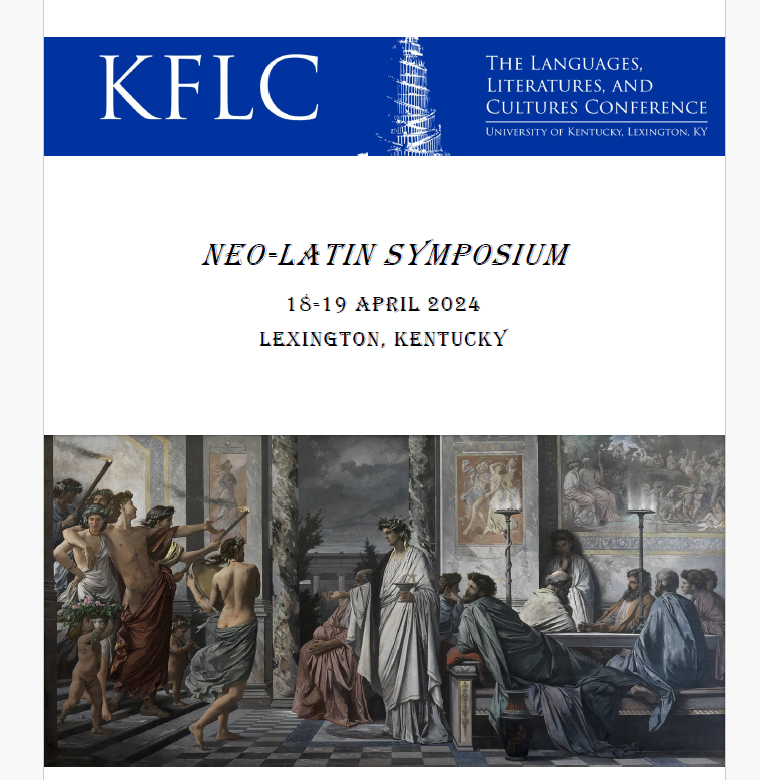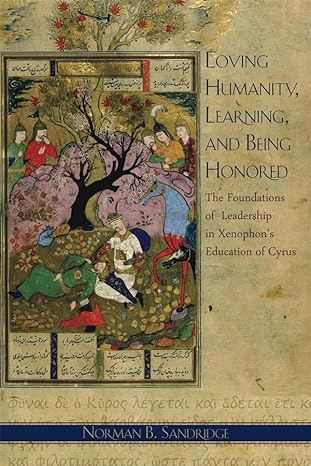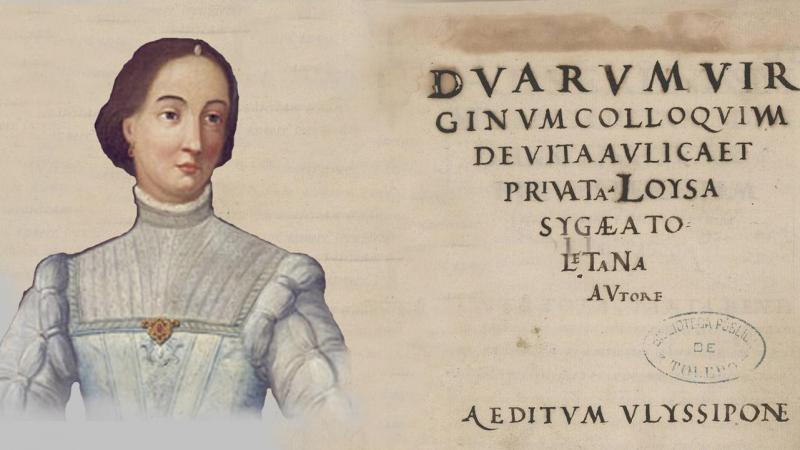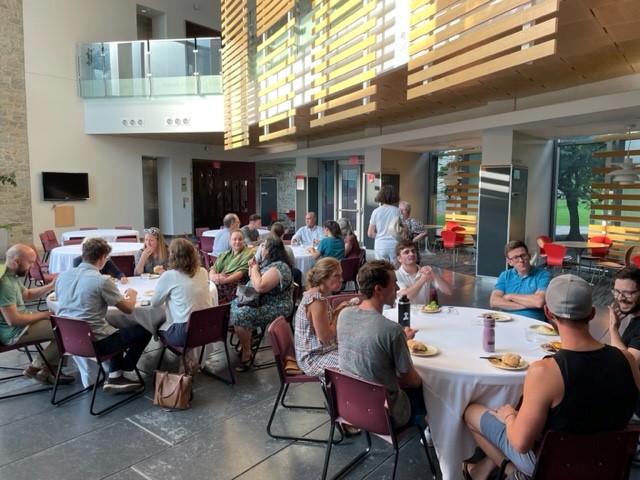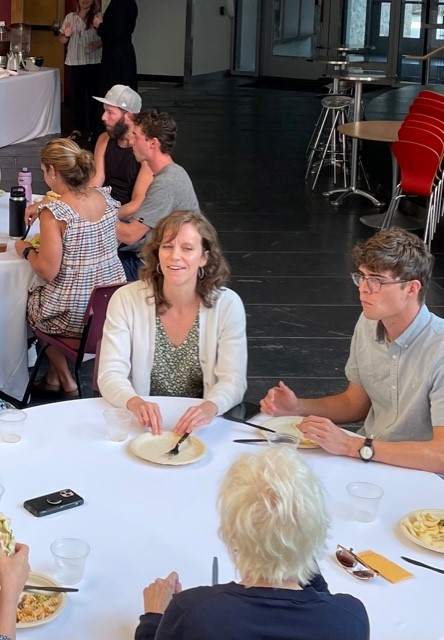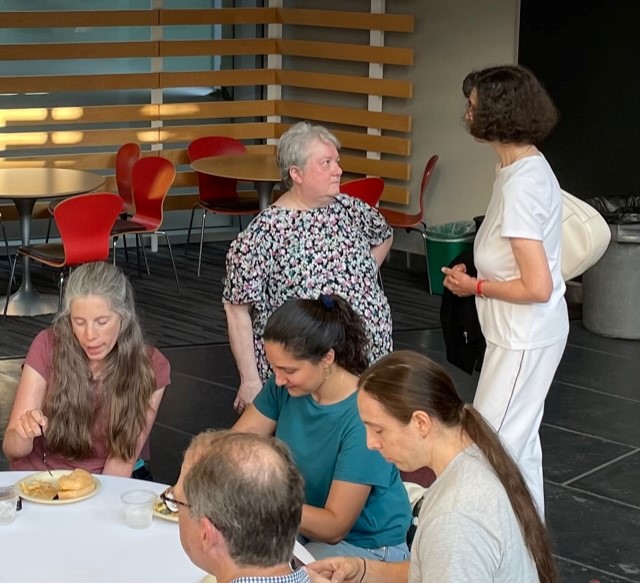This is a rather racy dialogue from Erasmus’ Colloquia Scholastica (1536). A discussion of the colloquia and link to the full text can be found here.
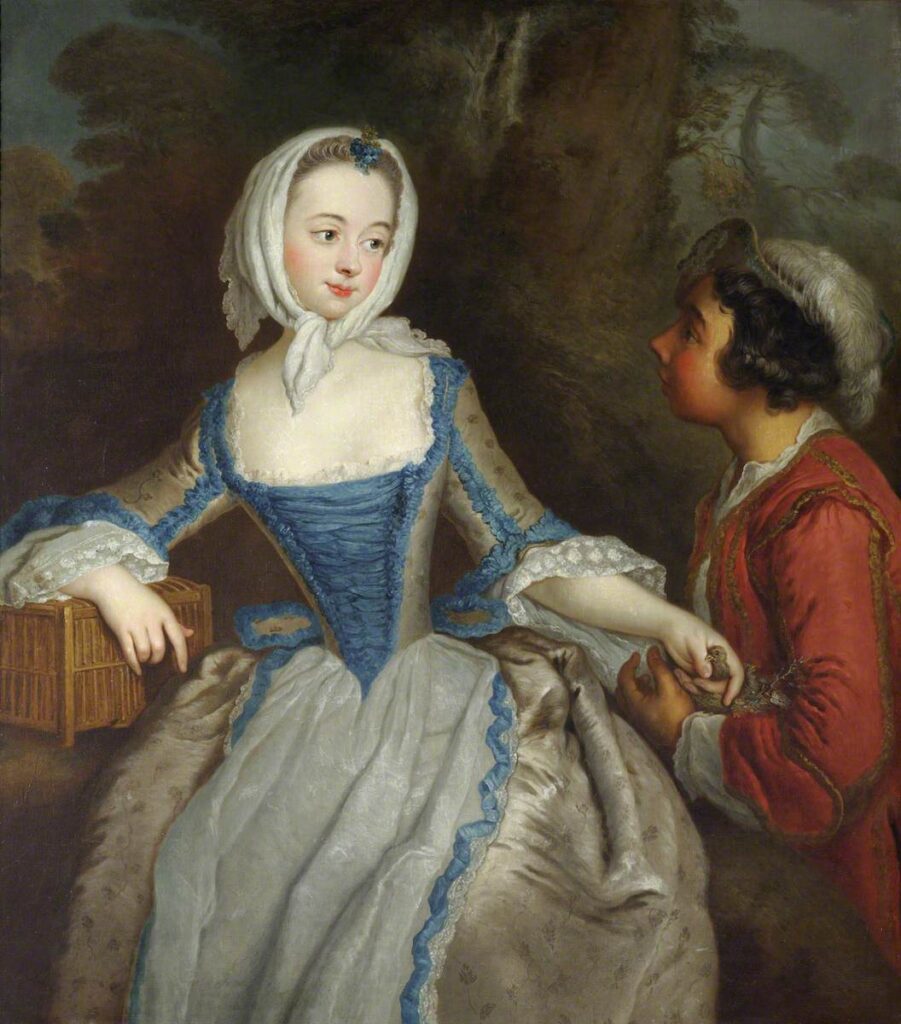
Pesne, Antoine; A Girl with a Birdcage and a Suitor; National Trust, Wimpole Hall; http://www.artuk.org/artworks/a-girl-with-a-birdcage-and-a-suitor-171663
Proci et puellae
Personae
Pamphilus, Maria.
Pamphilus
Salve crudelis, salve ferrea, salve adamantina.
Maria
Salve tandem et tu Pamphile, quoties et quantum voles, et quocunque libet nomine. Sed interim mihi videris oblitus nominis mei; Maria vocor.
Pamphilus
At Martiam dici oportuit.
Maria
Quid ita, quaeso? Quid mihi cum Marte?
Pamphilus
Quia quemadmodum illi deo pro ludo est, homines interficere, ita et tibi: nisi quod tu Marte crudelior occidis etiam amantem.
Maria
Bona verba. Ubinam strages ista mortalium, quos ego occidi? Ubi sanguis interfectorum?
Pamphilus
Unum cadaver vides exanime, si modo me vides.
Maria
Quid ego audio? Mortuus loqueris, et obambulas? utinam mihi nunquam occurrant umbrae formidabiliores!
Pamphilus
Ludis tu quidem; tamen interim miserum exanimas, et crudelius occidis, quam si confoderes telo. Nunc longo cruciatu excarnificor miser.
Maria
Eho, dic, quot gravidae ad tuum occursum abortierunt?
Pamphilus
Atqui pallor arguit exsanguem magis, quam ulla sit umbra.
Maria
Atqui iste pallor tinctus est viola. Sic palles ut cerasus maturescens, aut uva purpurascens.
Pamphilus
Satis procaciter rides miserum.
Maria
Atqui si mihi non credis, admove speculum.
Pamphilus
Non optarim aliud speculum; nec arbitror esse clarius ullum, quam in quo me nunc contemplor.
Maria
Quod speculum mihi narras?
Pamphilus
Oculos tuos.
Maria
Argutator, ut semper, tui similis es! Sed unde doces esse exanimem te? An cibum capiunt umbrae?
Pamphilus
Capiunt, sed insipidum, qualem ego.
Maria
Quibus igitur vescuntur?
Pamphilus
Malvis, porris, et lupinis.
Maria
Atqui tu non abstines a capis et perdicibus.
Pamphilus
Verum; sed interim nihilo plus sapiunt palato meo, quam si malvis vescerer, aut betis absque pipere, vino et aceto.
Maria
O te miserum! et tamen interim obesulus es. An et loquuntur exanimes?
Pamphilus
Sic ut ego, voce perquam exili.
Maria
Atqui nuper quum audirem te conviciantem rivali tuo, vox non erat admodum exilis. Sed obsecro te, num etiam ambulant umbrae? num vestiuntur? num dormiunt?
Pamphilus
Etiam coeunt, sed suo more.
Maria
Nae tu suavis nugator es.
Pamphilus
Sed quid dices, si argumentis Achilleis evincam, et me esse mortuum et te esse homicidam?
Maria
Absit omen, Pamphile: sed aggredere sophisma.
Pamphilus
Primum illud mihi donabis, opinor, mortem nihil aliud esse, quam abductionem animae a corpore.
Maria
Largior.
Pamphilus
Sed ita, ut ne reposcas, quod dederis.
Maria
Non fiet.
Pamphilus
Tum haud inficiaberis, eum qui alteri adimit animam, homicidam esse.
Maria
Accedo.
Pamphilus
Concedes et illud, quod, a gravissimis auctoribus dictum, tot seculorum suffragiis comprobatum est, animam hominis non illic esse ubi animat, sed ubi amat.
Maria
Istuc explana crassius: non enim satis assequor, quid velis.
Pamphilus
Et hoc sum infelicior, quod istuc non aeque sentis atque ego.
Maria
Fac ut sentiam.
Pamphilus
Eadem opera fac ut sentiat adamas.
Maria
Equidem puella sum, non lapis.
Pamphilus
Verum: sed adamante durior.
Maria
Sed perge colligere.
Pamphilus
Qui corripiuntur afflatu divino, nec audiunt, nec vident, nec olfaciunt, nec sentiunt, etiamsi occidas.
Maria
Audivi sane.
Pamphilus
Quid coniectas esse in caussa?
Maria
Dic tu, philosophe.
Pamphilus
Nimirum quoniam animus est in coelis, ubi habet quod vehementer amat, et abest a corpore.
Maria
Quid tum postea?
Pamphilus
Quid tum, dura? Illud consequitur, et me esse mortuum, et te esse homicidam.
Maria
Ubi est igitur anima tua?
Pamphilus
Illic ubi amat.
Maria
Quis autem ademit tibi animam? quid suspiras? Dic libere, dices impune.
Pamphilus
Crudelissima quaedam puella, quam ego tamen ne mortuus quidem odisse possum.
Maria
Humanum ingenium. Sed cur illi vicissim non adimis suam animam, par pari, quod aiunt, referens?
Pamphilus
Nihil me felicius, si quidem liceat facere permutationem, sic ut illius animus vicissim demigret in pectus meum, quemadmodum meus animus totus demigravit in corpus illius.
Maria
At licetne mihi tecum vicissim sophistam agere?
Pamphilus
Sophistriam.
Maria
Num fieri potest, ut idem corpus sit animatum, et exanime?
Pamphilus
Non eodem quidem tempore.
Maria
Quum abest anima, tum mortuum est corpus?
Pamphilus
Est.
Maria
Nec animat, nisi quum adest?
Pamphilus
Esto sane.
Maria
Qui fit igitur, ut, quum ibi sit, ubi amat, animet tamen corpus, unde demigravit? Quod si animat, etiam quum amat alibi, quomodo vocatur exanime corpus, quod animatum est?
Pamphilus
Argutare tu quidem satis sophistice; sed me talibus pedicis non capies. Anima, quae moderatur utcunque corpus animantis, improprie dicitur anima, quum revera sint tenues quaedam animae reliquiae; non aliter quam odor rosarum manet in manu, etiam rosa submota.
Maria
Difficile est, ut video, vulpem capere laqueo. Sed illud responde: Nonne agit, qui occidit?
Pamphilus
Maxime.
Maria
Et patitur, qui occiditur?
Pamphilus
Scilicet.
Maria
Qui fit igitur, ut, quum qui amat, agat, quae amatur, patiatur, occidere dicatur, quae amatur, quum amans potius occidat seipsum?
Pamphilus
Imo contra; qui amat patitur: quae amatur, agit.
Maria
Istuc nunquam evinces apud Areopagitas Grammaticos.
Pamphilus
At evincam apud Amphictyones Dialecticos.
Maria
Verum ne graveris et illud respondere. Volens amas, an nolens?
Pamphilus
Volens.
Maria
Quum igitur liberum sit non amare, videtur homicida, quisquis amat; praeterque ius accusat puellam.
Pamphilus
Atqui puella non ideo occidit quod amatur, sed quod non amat mutuum. Occidit autem; quisquis servare potest, nec servat.
Maria
Quid si iuvenis amet inconcessa, hoc est, uxorem alienam, aut virginem Vestalem? num illa amabit mutuum, ut servet amantem?
Pamphilus
Sed hic iuvenis amat, quod amare fas piumque est, atque etiam aequum et bonum, et tamen occiditur. Quod si leve est homicidii crimen, et veneficii ream peragam.
Maria
Istuc prohibeant superi. An Circen quampiam ex me facies?
Pamphilus
Aliquid et ista crudelius. Nam porcus aut ursus esse malim, quam id quod nunc sum, exanimis.
Maria
Quo tandem veneficii genere perdo homines?
Pamphilus
Fascino.
Maria
An igitur vis, ut posthac abs te deflectam noxios oculos?
Pamphilus
Bona verba. Imo magis afflecte.
Maria
Si mihi sunt oculi fascinatores, qui fit, ut non contabescant et ceteri, quos obtueor? Itaque suspicor fascinum istud esse in tuis oculis, non in meis.
Pamphilus
Non sat tibi erat iugulare Pamphilum, ni insultes insuper?
Maria
O lepidum mortuum! Sed quando parabuntur exsequiae?
Pamphilus
Opinione tua celerius, ni tu succurras.
Maria
Egon’ rem tantam possum?
Pamphilus
Potes vel mortuum ad vitam revocare, idque minimo negotio.
Maria
Si quis mihi porrigat panacen.
Pamphilus
Nihil opus herbis; tantum redama. Quid autem facilius, imo quid aequius? Non aliter absolveris ab homicidii crimine.
Maria
Apud quod tribunal peragar rea? Areopagitarum?
Pamphilus
Non; sed apud tribunal Veneris.
Maria
Aiunt deam esse placabilem.
Pamphilus
Imo nullius ira perinde formidabilis.
Maria
Habet fulmen?
Pamphilus
Non.
Maria
Habet tridentem?
Pamphilus
Nequaquam.
Maria
Habet hastam?
Pamphilus
Minime, sed est dea maris.
Maria
Non navigo.
Pamphilus
Sed habet puerum.
Maria
Non est formidabilis aetas.
Pamphilus
Vindicem ac pervicacem.
Maria
Quid is mihi faciet?
Pamphilus
Quid faciet? Prohibeant omnes superi. Nolim enim illi malum ominari, cui bene volo.
Maria
Tamen effare; nulla mihi superstitio est.
Pamphilus
Dicam ergo. Si hunc spreveris amantem non omnino mutuo indignum amore, nisi fallor, ille fortasse iussu matris immittet tibi pessimo veneno tinctum iaculum, ut in sordidum aliquem depereas, qui te tamen non redamet.
Maria
Supplicium narras abominandum. Ego sane vel mori praeoptarim, quam perdite amare deformem, nec amore mutuo respondentem.
Pamphilus
Atqui nuper huius mali fuit exemplum insigniter editum in puellam quandam.
Maria
Ubi locorum?
Pamphilus
Aureliae.
Maria
Quot anni sunt?
Pamphilus
Quot anni? vix sunt menses decem.
Maria
Puellae quod erat nomen? Quid haeres?
Pamphilus
Nihil; novi tanquam te.
Maria
Quin igitur edis nomen?
Pamphilus
Quia non placet omen. Utinam alio quovis nomine dicta fuisset. Idem habebat nomen quod tu.
Maria
Pater quis erat?
Pamphilus
Vivit adhuc inter iureconsultos praecipui nominis, re splendida.
Maria
Adde nomen.
Pamphilus
Mauritius.
Maria
Cognomen.
Pamphilus
Aglaius.
Maria
Vivitne mater?
Pamphilus
Nuper reliquit superos.
Maria
Quo morbo periit?
Pamphilus
Quo morbo rogas? moerore. Et pater, tametsi vir cum primis fortis, periclitabatur.
Maria
Licetne scire matris quoque nomen?
Pamphilus
Maxime. Sophronam nemo non novit. Sed quid sibi vult ista percunctatio? An me putas apologum comminisci?
Maria
Egone de te suspicarer hoc? Haec suspicio pronior est in sexum nostrum. Sed narra, quid acciderit puellae.
Pamphilus
Puella erat honesto loco nata, ut dixi, re lauta, forma perquam eleganti: qui multis? digna principe marito. Huius nuptias ambiebat procus quidam illi non dissimilis.
Maria
Quo nomine?
Pamphilus
Hei mihi, offendor omine; Pamphilus et ille dictus est. Illa nihil non tentantem pertinacissime sprevit. Iuvenis dolore contabuit. Nec ita multo post illa deperire coepit in quendam, simium verius quam hominem.
Maria
Quid ais?
Pamphilus
Adeo perdite, ut satis dici non queat.
Maria
Tam elegans puella tam deformem?
Pamphilus
Vertice acuminato, raro capillitio, eoque lacero et impexo, furfure ac lendibus oppleto: pleramque cranii cutem nudaverat alopecia; oculis refugis, naribus simis ac sursum hiantibus, ore sparso, dentibus putridis, balbutiente lingua, mento scabioso; scapulas deformabat gibbus; venter prominulus, crura vara.
Maria
Thersiten quempiam mihi depingis.
Pamphilus
Imo aiunt, illi non fuisse nisi unam auriculam.
Maria
Altera perierat illi fortasse in bello.
Pamphilus
Imo in pace.
Maria
Quis hoc ausus est?
Pamphilus
Dionysius carnifex.
Maria
Fortasse formae infelicitatem pensabat res ampla domi?
Pamphilus
Imo decoxerat, ac plus quam animam debebat. Cum hoc marito tam insignis puella nunc degit aetatem, ac subinde vapulat.
Maria
Rem miseram narras.
Pamphilus
Sed veram. Sic visum est Nemesi iuvenis spreti contumeliam ulcisci.
Maria
Ego citius optarem exstingui fulmine, quam talem ferre maritum.
Pamphilus
Ergo ne provoca Nemesim, et amantem redama.
Maria
Si quidem istuc satis est, redamo.
Pamphilus
Sed optarim istum amorem esse perpetuum ac proprium: coniugem ambio, non amicam.
Maria
Neque me id fugit; sed diu deliberandum est in eo, quod semel coeptum rescindi non potest.
Pamphilus
Apud me quidem nimium diu deliberatum est.
Maria
Vide autem, ne tibi imponat amor, non optimus consultor. Nam caecum esse ferunt.
Pamphilus
Sed oculatus est, qui ex iudicio nascitur. Non ideo mihi talis videris, quod amem te; sed ideo te amo, quod talem te conspexerim.
Maria
At vide, ne non satis me perspectam habeas. Si calceum induisses, tum demum sentires, qua parte te urgeret.
Pamphilus
Iacienda est alea; quanquam ego multis auguriis colligo rem melius cessuram.
Maria
Etiam augur es?
Pamphilus
Sum.
Maria
Quibus igitur auguriis colligis? An volavit noctua?
Pamphilus
Illa volat stultis.
Maria
An a dextris advolavit iugum columbarum?
Pamphilus
Nihil istiusmodi. Sed mihi iam annis aliquot perspecta est probitas tuorum parentum: ea primum avis est non pessima, e bonis prognatam esse. Neque me clam est, quam salubribus monitis, quam sanctis exemplis apud hos sis instituta. Et plus est bene institui, quam bene nasci. Habes alterum augurium. Ad haec meis maioribus non omnino malis, ni fallor, iam olim cum tuis amicitia non vulgaris intercedit: quin et nos inter nos a teneris, quod aiunt, unguiculis noti sumus; nec male convenit geniis nostris. Iam aetas inter nos, res, dignitas, nobilitas, inter utriusque parentes paene paria sunt. Demum, quod est in amicitia praecipuum, tui mores mihi videntur non pessime quadrare ad meum ingenium. Potest enim per se praeclarum esse, quod tamen non sit aptum. Quam mei vicissim tuo congruant, nescio. Hae videlicet aves, mea lux, mihi promittunt fore inter nos felix, perpetuum ac laetum iucundumque connubium, modo ne tuus animus mali ominis cantionem nobis occinat.
Maria
Quam cantilenam optas?
Pamphilus
Ego praecinam: Sum tuus; tu succine: Sum tua.
Maria
Brevis quidem cantiuncula; sed longum habet epiphonema.
Pamphilus
Quid refert, quam longum, modo laetum?
Maria
Adeo mihi es invisus, ut nolim te committere, cuius in posterum poeniteat.
Pamphilus
Desine male ominari.
Maria
Fortassis alia tibi videbor, ubi morbus aut aetas hanc formam immutarit.
Pamphilus
Nec hoc corpus, o bona, semper erit aeque succulentum. Sed ego non contemplor tantum istud undique florens et elegans domicilium, hospitem magis adamo.
Maria
Quem hospitem?
Pamphilus
Animum istum tuum, cuius decor semper cum aetate crescet.
Maria
Nae tu plus quam Lynceus es, si istum perspicis per tot tectoria.
Pamphilus
Animum animo perspicio. Ad haec, in communibus liberis subinde repubescemus.
Maria
Sed interim perit virginitas.
Pamphilus
Verum. Sed eho, dic mihi, si tibi esset elegans pomarium, optares illic nihil unquam gigni praeter flores: an malles, delapsis floribus, videre arbores maturis pomis gravidas?
Maria
Ut argutatur!
Pamphilus
Saltem illud responde, utrum est elegantius spectaculum, vitis humi iacens et computrescens, an amplexa palum aut ulmum, eamque purpureis uvis degravans?
Maria
Responde tu mihi vicissim, utrum spectaculum amoenius, rosa nitens et lactea in suo frutice, an decerpta digitis ac paullatim marcescens?
Pamphilus
Ego rosam existimo feliciorem, quae marcescit in hominis manu, delectans interim et oculos et nares, quam quae senescit in frutice: nam et illic futurum erat, ut marcesceret; quemadmodum felicius est vinum, quod bibitur antequam acescat. Quanquam non statim marcescit flos puellae, si nupserit: imo video, multas, quae ante nuptias pallebant, languebant, ac velut extabescebant, ex congressu viri sic enituisse, ut tum demum florere coeperint.
Maria
Attamen favorabilis ac plausibilis apud omnes est virginitas.
Pamphilus
Elegans quidem res puella virgo: sed quid iuxta naturam prodigiosius anu virgine? Nisi matri tuae defluxisset flos ille, nos istum flosculum non haberemus. Quod si, ut spero, non sterile fuerit nostrum coniugium, pro una virgine multas dabimus.
Maria
Attamen aiunt, rem Deo gratissimam esse castitatem.
Pamphilus
Et ideo castam puellam mihi cupio nubere, ut cum illa caste vivam. Magis erit animorum quam corporum coniugium. Gignemus Reipublicae, gignemus Christo. Quantulum aberit hoc matrimonium a virginitate? Et fortasse olim sic convivemus, quemadmodum vixit cum Maria Ioseph. Sed interim discemus virginitatem. Non enim statim pervenitur ad summum.
Maria
Quid ego audio? Violanda virginitas, ut discatur?
Pamphilus
Quidni? Quemadmodum paulatim bibendo vinum parcius, discimus esse abstemii. Uter tibi videtur temperantior, qui in mediis deliciis accumbens abstinet, an qui semotus ab his, quae provocant intemperantiam?
Maria
Arbitror eum fortius temperantem, quem parata copia non potest corrumpere.
Pamphilus
Utri verius debetur laus castitatis, eine qui semet exsecat, an qui membris integris, tamen abstinet a Venere?
Maria
Equidem posteriori, meo calculo, tribuerim laudem castitatis, priori dementiam.
Pamphilus
An qui voto adstricti abiurant matrimonium, nonne quodam modo exsecant sese?
Maria
Videtur.
Pamphilus
Iam non est virtus non coire.
Maria
At non est?
Pamphilus
Sic accipe. Si per se virtus esset non coire, vitium esset coire. Nunc incidit, ut vitium sit non coire, coire virtus.
Maria
Quando hoc incidit?
Pamphilus
Quoties ab uxore ius suum petit maritus, praesertim si prolis amore quaerit complexum.
Maria
Quid si lasciviat? non est fas negari?
Pamphilus
Fas est monere, vel rogare potius blandius, ut temperet: pernegare instanti, fas non est. Quanquam hac quidem in parte raras audio querelas maritorum de suis uxoribus.
Maria
At dulcis est libertas.
Pamphilus
Imo gravis est sarcina virginitas. Ego tibi rex ero, tu mihi regina: imperabimus familiae nostro arbitratu: an tibi videtur ista esse servitus?
Maria
Vulgus coniugium capistrum vocat.
Pamphilus
Sed ipsi vero capistro digni sunt, qui sic vocant. Dic mihi, quaeso, an non animus tuus est alligatus corpori?
Maria
Videtur.
Pamphilus
Non aliter quam avicula caveae. Et tamen consule illum, an cupiat esse liber. Negabit, opinor. Quam ob rem? Quia libenter est alligatus.
Maria
Res est utrinque modica.
Pamphilus
Tanto tutior. Eam tu domi augebis parsimonia, quae non sine caussa dicta est magnum vectigal; ego foris industria.
Maria
Innumeras curas secum adferunt liberi.
Pamphilus
Sed iidem innumeras voluptates, ac saepenumero multo cum foenore reponunt parentibus officium.
Maria
Misera quaedam res est orbitas.
Pamphilus
An nunc orba non es? Quid autem opus in re dubia male ominari? Dic mihi, utrum malles nunquam nasci, an nasci moritura?
Maria
Equidem malim nasci moritura.
Pamphilus
Sic miserior est orbitas, quae prolem nec habuit, nec habitura est quemadmodum feliciores sunt, qui vixerunt, quam qui nec nati sunt, nec nascentur unquam.
Maria
Qui sunt isti, qui non sunt, nec erunt?
Pamphilus
Quanquam qui recusat ferre casus humanos, quibus omnes ex aequo sumus obnoxii, sive plebeii sumus, sive reges, is e vita migret oportet; et tamen quidquid acciderit, tu non feres nisi dimidium, ego maiorem portionem in me transferam. Ita si quid acciderit laeti, gemina fiet voluptas, si quid mali, societas adimet dimidium aegritudinis. Mihi vero, si fata vocent, dulce fuerit vel immori tuis complexibus.
Maria
Facilius ferunt homines, quod iuxta communes naturae leges accidit; sed video, quanto plus molestiarum adferunt nonnullis parentibus liberorum mores, quam mortes.
Pamphilus
Istius rei ne quid accidat, maxima ex parte in nobis situm est.
Maria
Qui sic?
Pamphilus
Quoniam fere boni nascuntur ex bonis, quod ad indolem attinet. Neque enim e columbis nascuntur milvii. Dabimus igitur operam, ut ipsi boni simus. Deinde curabimus liberos nostros ab ipso statim lacte sanctis praeceptis et opinionibus imbuendos. Plurimum refert, quid infundas rudi testulae. Ad haec curabimus, ut domi habeant exemplum vitae, quod imitentur.
Maria
Difficile est quod narras.
Pamphilus
Nec mirum; quia pulchrum est: atque ob hoc ipsum tu quoque difficilis es. At tanto studiis acrioribus huc enitemur.
Maria
Habebis sequacem materiam; tu vide, ut me formes fingasque.
Pamphilus
Sed interim pronuntia tria verba.
Maria
Nihil facilius; sed verba simulatque semel evolarint, non revolant. Dabo consilium utrique commodius. Ages cum tuis ac meis parentibus, ut utrorumque voluntate res transigatur.
Pamphilus
Ambire me iubes: tu potes tribus verbis rem certam reddere.
Maria
An possim, nescio: mei iuris non sum. Nec sine maiorum auctoritate olim coibant coniugia. Verum, utcunque est, arbitror, auspicatius fore nostrum coniugium, si parentum auctoritate coëat. Et vestrum est ambire, nobis decorum non est. Gaudet enim rapi virginitas, etiamsi nonnunquam vehementius amemus.
Pamphilus
Non pigebit ambire, modo ne me frustretur tuum unius suffragium.
Maria
Non frustrabitur; bono animo esto, mi Pamphile.
Pamphilus
Tu mihi heic religiosior es, quam vellem.
Maria
Imo tu tuum ipsius suffragium apud te prius expende. Nec affectum istum tuum adhibe in consilium, sed rationem. Quod affectus decernit, temporarium est: quod autem dictat ratio, perpetuo solet placere.
Pamphilus
Nae tu pulchre philosopharis; itaque parere certum est tuis consiliis.
Maria
Non poenituerit obsequii. Sed heus tu, incidit interim scrupulus, qui meum animum male habet.
Pamphilus
Valeant scrupuli.
Maria
Vin’ me nubere mortuo?
Pamphilus
Nequaquam sed revixero.
Maria
Amovisti scrupulum. Bene vale, mi Pamphile.
Pamphilus
Istuc tu cura.
Maria
Precor tibi laetam noctem. Quid suspiras?
Pamphilus
Laetam noctem ais? Utinam largiare, quod precaris.
Maria
Ne quid praepropere; adhuc tua messis in herba est.
Pamphilus
Nihilne tui mecum auferam?
Maria
Hunc pastillum, qui tibi cor exhilaret.
Pamphilus
Adde saltem osculum.
Maria
Cupio tibi virginitatem integram et illibatam tradere.
Pamphilus
An osculum aliquid decerpit virginitati?
Maria
Vis igitur, ut aliis quoque largiar oscula?
Pamphilus
Nequaquam: mihi servari volo mea oscula.
Maria
Tibi servo. Quanquam est aliud, cur in praesentia nec ausim dare osculum.
Pamphilus
Quid istuc?
Maria
Ais, tuum animum paene totum demigrasse in corpus meum; in tuo quam minimum superesse: vereor itaque, ne in osculo hoc ipsum; quod in te superest, transiliat in me, tuque iam totus fias exanimis. Accipe igitur dextram, mutui amoris symbolum, ac bene vale. Tu gnaviter rem gere. Ego interim Christum comprecabor, ut, quod agitur, utrique nostrum velit esse felix ac faustum.
 The Conventiculum Dickinsoniense is an immersion seminar designed for those who want to acquire some ability at ex-tempore expression in Latin. A wide range of people can benefit from the seminar: professors in universities, teachers in secondary schools, graduate students, undergraduates, and other lovers of Latin, provided that anyone who considers applying has a solid understanding of the grammatical essentials of the Latin language. (Participants must be at least 18 years of age, unless accompanied by an adult guardian).
The Conventiculum Dickinsoniense is an immersion seminar designed for those who want to acquire some ability at ex-tempore expression in Latin. A wide range of people can benefit from the seminar: professors in universities, teachers in secondary schools, graduate students, undergraduates, and other lovers of Latin, provided that anyone who considers applying has a solid understanding of the grammatical essentials of the Latin language. (Participants must be at least 18 years of age, unless accompanied by an adult guardian).